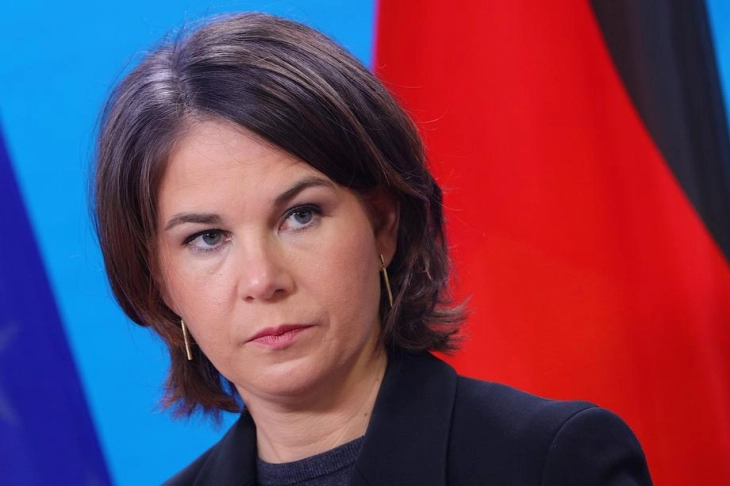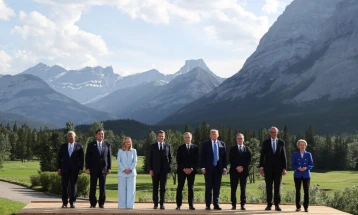German and French foreign ministers visit Syria to meet new leaders
- The foreign ministers from Germany and France arrived in Damascus on Friday morning for talks with the transitional government formed by the militant groups that drove former Syrian ruler Bashar al-Assad from the country.

Damascus, 3 January 2025 (dpa/MIA) - The foreign ministers from Germany and France arrived in Damascus on Friday morning for talks with the transitional government formed by the militant groups that drove former Syrian ruler Bashar al-Assad from the country.
The diplomats, whose travel plans were not announced in advance, are expected to outline conditions for a resumption of relations between Syria's new de facto government and the European Union.
"A political new beginning between Europe and Syria, between Germany and Syria, is possible," said German Foreign Minister Annalena Baerbock
She arrived with her French counterpart, Jean-Noël Barrot, and on behalf of the EU "with this outstretched hand, but also with clear expectations of the new rulers."
The visit comes some four weeks after a rapid rebel advance finally toppled al-Assad from power following more than a decade of brutal civil war. Al-Assad fled Damascus for Russia.
Baerbock and Barrot are the first EU foreign ministers to visit Syria since al-Assad's overthrow. They, on behalf of the EU's foreign representative Kaja Kallas, plan to hold talks with representatives of the rebel-formed transitional government.
De facto ruler Ahmed al-Sharaa is the leader of the Islamist rebel group Hayat Tahrir al-Sham (HTS), a group that is designated as a terrorist organization by the EU and the United States, and was previously known by his nom de guerre Abu Mohammed al-Jolani.
Baerbock flew to Damascus from Cyprus on Friday morning on a German military A400M propeller transport aircraft. Barrot had celebrated the New Year with Defence Minister Sébastien Lecornu and the French troops stationed with the United Nations Interim Force in Lebanon (UNIFIL).
Baerbock demands protection for women, minorities
"A new beginning can only happen if the new Syrian society grants a place in the political process to all Syrians, women and men, of every ethnic or religious group, and provides rights and protection," Baerbock said.
She added that these rights must be preserved and must "not be undermined potentially by overly long deadlines until elections or moves towards the Islamization of the judicial or education systems."
Al-Sharaa recently stated that it could take around three years to present a new draft constitution, and another year until elections. The Arab country remains fragmented and divided along sectarian lines.
Even after al-Assad's fall, hostile militias are fighting for power, and the HTS-backed transitional government does not hold control over large parts of the country. Troops from several foreign powers, including Turkey, the US, Israel and Russia, are also stationed in different parts of the country.
Baerbock said they wanted to support Syria in a peaceful transition of power, the reconciliation of society, and reconstruction - in addition to the humanitarian aid that has been provided for the people in Syria in the past.
"A new beginning can only happen if the past is addressed, justice is established, and retaliatory acts against population groups do not occur," Baerbock insisted. She added that extremism and radical groups should have no place.
Scepticism over the rebels' past
"We know where the HTS ideologically comes from, what they have done in the past," Baerbock stated. But she said there is also a desire for moderation and understanding with other key players. The initiation of talks with the Kurdish-dominated Syrian Democratic Forces (SDF) is a significant sign in this direction, she noted.
HTS emerged from the al-Nusra Front, an offshoot of the terrorist network al-Qaeda. Al-Sharaa had disassociated from al-Qaeda and Islamic State, which have both repeatedly claimed responsibility for deadly terrorist attacks in a number of Western countries.
However, there have been reports suggesting that the HTS leadership maintains contact with al-Qaeda.
Baerbock : We will judge HTS by their actions
Given this, Baerbock stated, "We will continue to judge the HTS by their actions. Despite all scepticism, we must not miss the opportunity now to support the people in Syria at this crucial crossroads."
Germany is also working to ensure that the intra-Syrian process is not disrupted from outside, the foreign minister explained.
This, she noted, includes respect for sovereignty and territorial integrity by all neighbouring states. Though she did not mention Turkey and Israel by name, those countries have been accused of pursuing their own interests in Syria.
Additionally, it is time for Russia to leave its military bases in Syria, she said. Moscow has been one of al-Assad's most important allies for years.
More than 16 million Syrians rely on humanitarian aid
Syria has been largely destroyed after nearly 14 years of civil war and is contaminated with landmines and other ordnance.
The country lacks labour and skilled workers, the economy is contracting, and the currency has lost more than 90% of its value since 2020. Public services have collapsed. More than 16 million people rely on humanitarian aid.
Nearly 1 million Syrians in Germany
In Baerbock's discussions in Damascus, the potential return of Syrian refugees from Germany, as supported by the transitional Syrian government, is likely to be a topic.
Around 975,000 Syrians currently live in Germany, according to the German Interior Ministry. Most arrived in the country since 2015 as a result of the civil war.
MIA file photo







